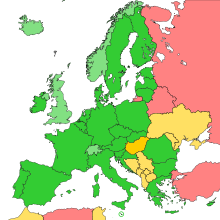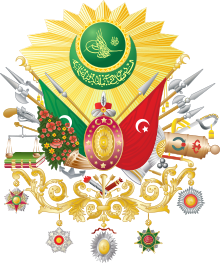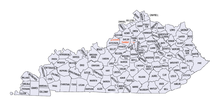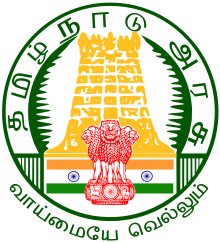| Main | Topics and categories | Tasks and projects |
The Politics portal
Politics (from Ancient Greek πολιτικά (politiká) 'affairs of the cities') is the set of activities that are associated with making decisions in groups, or other forms of power relations among individuals, such as the distribution of resources or status. The branch of social science that studies politics and government is referred to as political science.
It may be used positively in the context of a "political solution" which is compromising and non-violent, or descriptively as "the art or science of government", but also often carries a negative connotation. The concept has been defined in various ways, and different approaches have fundamentally differing views on whether it should be used extensively or in a limited way, empirically or normatively, and on whether conflict or co-operation is more essential to it.
A variety of methods are deployed in politics, which include promoting one's own political views among people, negotiation with other political subjects, making laws, and exercising internal and external force, including warfare against adversaries. Politics is exercised on a wide range of social levels, from clans and tribes of traditional societies, through modern local governments, companies and institutions up to sovereign states, to the international level.
In modern nation states, people often form political parties to represent their ideas. Members of a party often agree to take the same position on many issues and agree to support the same changes to law and the same leaders. An election is usually a competition between different parties.
A political system is a framework which defines acceptable political methods within a society. The history of political thought can be traced back to early antiquity, with seminal works such as Plato's Republic, Aristotle's Politics, Confucius's political manuscripts and Chanakya's Arthashastra. ( Full article...)
Selected article
" Daisy", sometimes referred to as "Daisy Girl" or "Peace, Little Girl", is an American political advertisement that aired on television as part of Lyndon B. Johnson's 1964 presidential campaign. Though aired only once, it is considered one of the most important factors in Johnson's landslide victory over the Republican Party's candidate, Barry Goldwater, and a turning point in political and advertising history. A partnership between the Doyle Dane Bernbach agency and Tony Schwartz, the "Daisy" advertisement was designed to broadcast Johnson's anti-war and anti-nuclear positions. Goldwater was against the Nuclear Test Ban Treaty and suggested the use of nuclear weapons in the Vietnam War, if necessary. The Johnson campaign used Goldwater's speeches to imply he would wage a nuclear war.
Featured picture
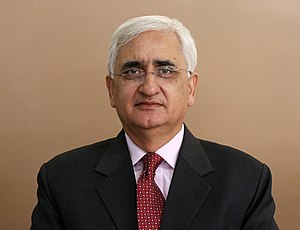
Salman Khurshid (born 1 January 1953) is an Indian politician belonging to the Indian National Congress, a lawyer, and a writer who has been elected from Farrukhabad Lok Sabha constituency in the General Election of 2009. He belongs to the Farrukhabad area. He is presently the Cabinet Minister of the Ministry of Law and Justice and Ministry of Minority Affairs.
Selected quote
Selected biography
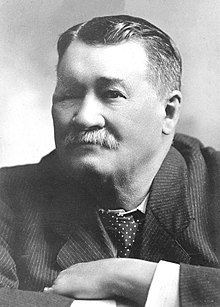
Leverett George DeVeber (sometimes spelled De Veber) (February 10, 1849 – July 9, 1925) was a Canadian politician who served as Member of the Legislative Assemblies of Alberta and the North-West Territories, minister in the government of Alberta, and member of the Senate of Canada. Born in New Brunswick and trained as a physician, he joined the North-West Mounted Police and came west, eventually settling in Lethbridge after leaving the police force. He represented Lethbridge in the North-West Legislative Assembly from 1898 until 1905, when Lethbridge became part of the new province of Alberta. He was appointed Minister without Portfolio in Alberta's first government, but resigned four months later to accept an appointment to the Senate, where he remained until his death.
Did you know (auto-generated) -

- ... that Kaczyzm is a pejorative term describing the political ideology of Polish politicians Lech and Jarosław Kaczyński and their Law and Justice party?
- ... that Sears heiress Edith Rosenwald Stern organized a women's broom brigade against political corruption in New Orleans?
- ... that Colin Mackay, the political editor at Scottish Television, was "very sad" when Colin MacKay, the political editor at Scottish Television, died?
- ... that one of the arguments made by the Simla Deputation for increasing Muslim representation in Indian politics was that they had ruled India under the Mughal Empire?
- ... that before becoming the mayor of Medan, Indonesia, Agus Salim Rangkuti acted in movies and oversaw a real-life political prison camp?
- ... that one abolitionist said that William L. Breckinridge's anti-slavery views would "disqualify [him] from political usefulness"?
More did you know...
- ...that Thutmose I was the first Pharaoh to be buried in the Valley of the Kings?
- ...that the National Assembly of Azerbaijan was the first secular republican parliament in the Muslim world?
- ...that in world-system theory, sociologists debate whether two world-systems have ever existed during the same period?
- ...that former Republican California State Senator Becky Morgan served on the Board of Trustees of both her alma maters, Stanford University and Cornell University?
- ...that Chinese Taipei is the designated name the Republic of China (Taiwan) uses in most international organizations?
- ...that when the Tennessee Center for Policy Research, a "free-market think tank," criticized Al Gore's energy use, CNN mistakenly called the organization an environmental group?
In this month
- June 28, 2004 - Canadian federal elections occur; the Liberal party loses its absolute majority.
News and Current events
- August 11: 4 local government areas in New South Wales, Australia locked down after COVID-19 case
- August 11: Australia: AstraZeneca vaccine access expanded by Victorian government
- August 1: Australia: Victorian lockdown lifted
- July 29: Tunisia's president dismisses prime minister, suspends parliament
- July 25: Australia: Wikinews interviews Reg Kidd, mayor of the City of Orange, about COVID-19 lockdown and local government
- July 23: South Australia enters week-long lockdown to contain COVID-19 Delta variant spread
- July 21: Technological University Dublin senior lecturer Dr Lorcan Sirr speaks to Wikinews on housing market in Ireland
- July 21: Three rural councils in New South Wales, Australia enter 7-day lockdown
- July 21: Australia: Victoria lockdown extended by a week with 85 active cases recorded
- July 15: California governor signs new state budget, eligible Californians to get stimulus payments
Topics and categories
General images
Related portals
Associated Wikimedia
The following Wikimedia Foundation sister projects provide more on this subject:
-
Commons
Free media repository -
Wikibooks
Free textbooks and manuals -
Wikidata
Free knowledge base -
Wikinews
Free-content news -
Wikiquote
Collection of quotations -
Wikisource
Free-content library -
Wikiversity
Free learning tools -
Wiktionary
Dictionary and thesaurus







